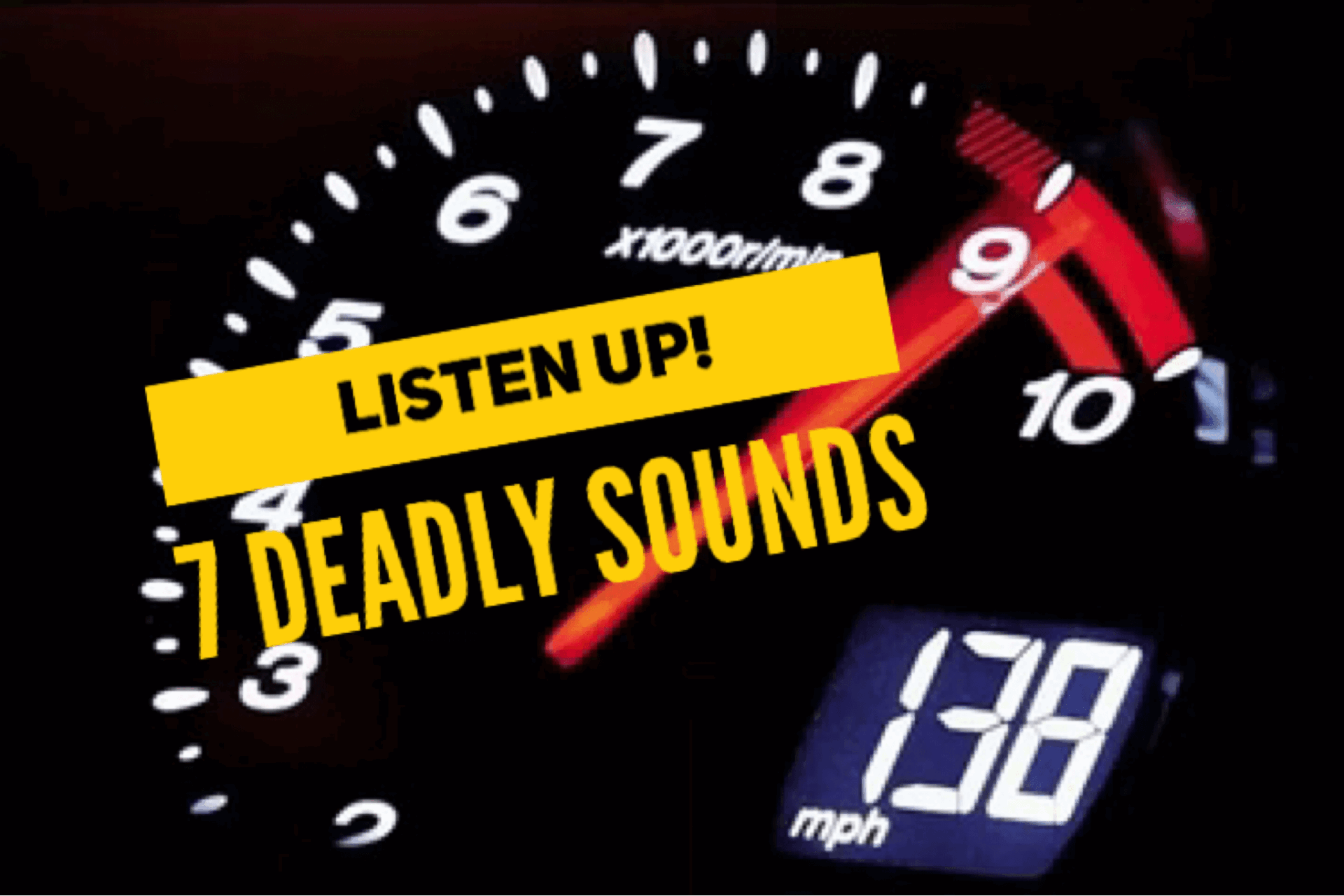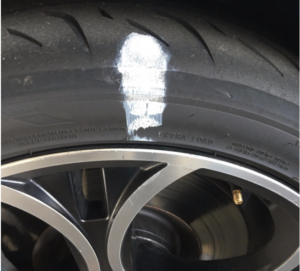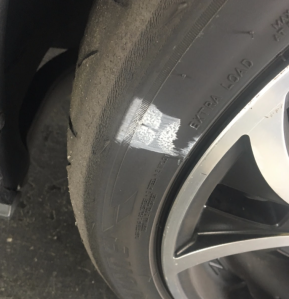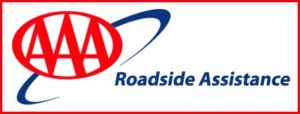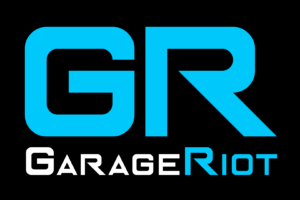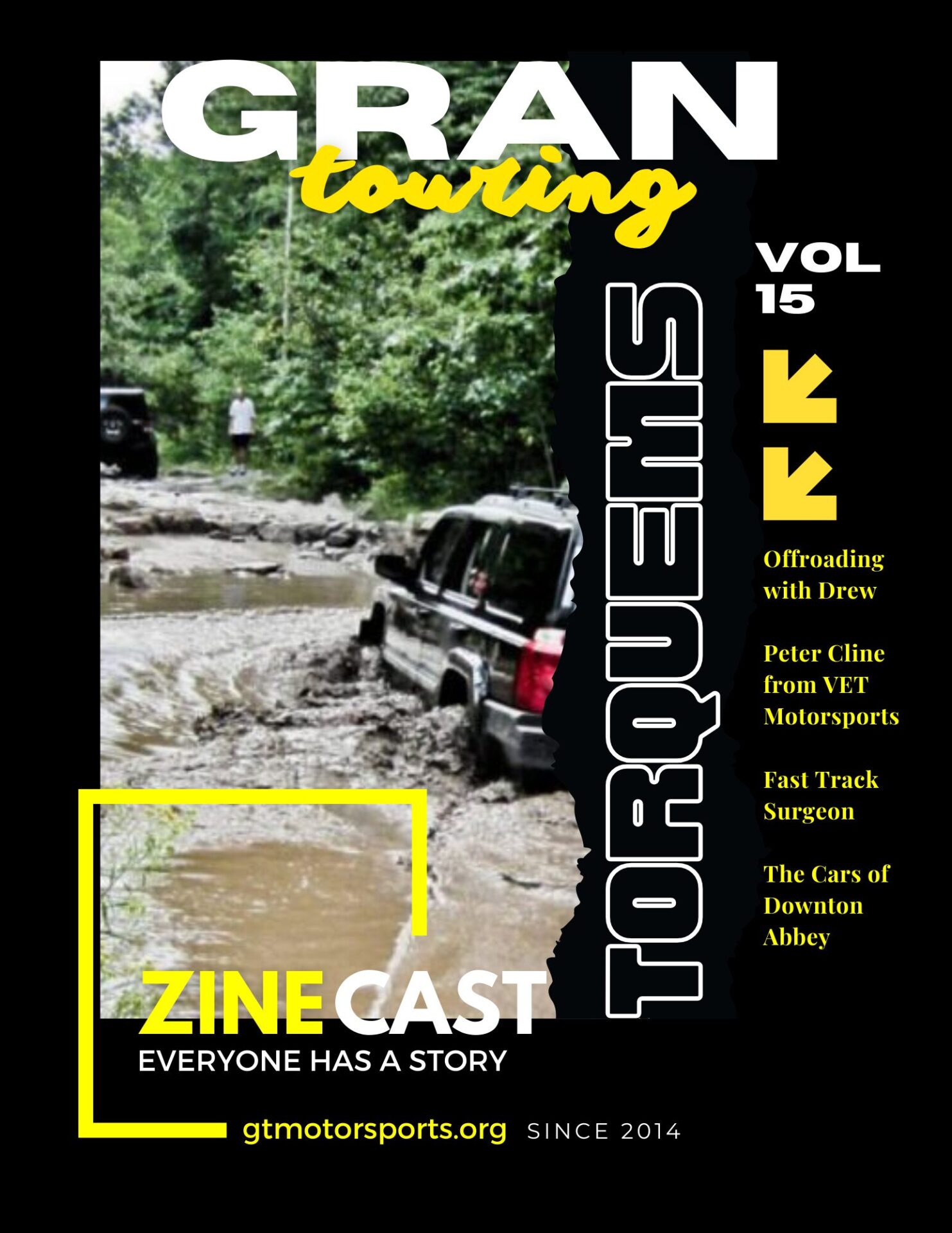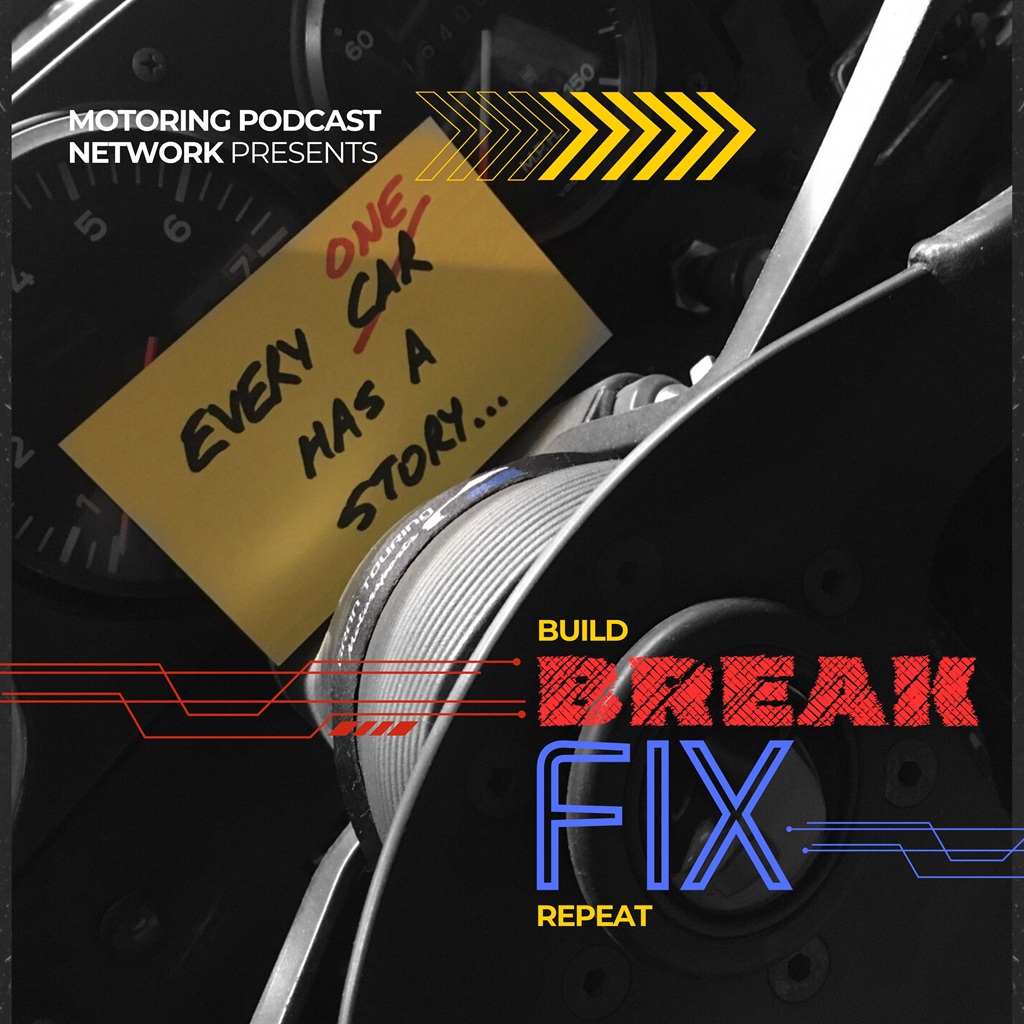Crew Chief Brad: [00:00:00] Grand Touring Motorsports started as a social group of car enthusiasts, but we’ve expanded into all sorts of motorsports disciplines, and we want to share our stories with you. Years of racing, wrenching, and motorsports experience brings together a top notch collection of knowledge and information through our podcast, Brake Fix.
What’s going on everybody? It’s me, back again, your host, Brad, the triple six. With me, as always, is my co host Eric. Hello! For today’s episode, we’re going to talk about the language of your car. High performance driving requires intense concentration and focus. Often leading to ignoring important signals your vehicle may be sharing with you.
Your car is always talking to you.
Crew Chief Eric: There’s a lot of sounds going on in a car. I mean, most people, you know, go down the road not worrying about it.
Crew Chief Brad: You better listen to the sounds that it makes. We say high performance driving, but also this applies to just street driving as well. But there are Seven deadly sounds much like the seven deadly [00:01:00] sins that you should listen out for from your car because they tell you something they tell you about the health of your vehicle and what’s going on.
So, without further ado, we’re going to get into a quick guide about the 7 deadly sound.
Crew Chief Eric: So we’re going to dive into the technical again. This does apply to both your street car and your track car. And remember, we use the term track loosely. It applies to all sorts of different things. Disciplines. And again, this is going to be a quick guide to get you familiar with that.
We’re going to play audio clips of the sounds themselves. That way you can become more familiar with them and then give you a, an explanation of what they mean. So we’re going to start off with coins in the dryer.
So if you can identify a sound that’s reminiscent of coins in the dryer, they’re usually coming from your wheels. And it’s a strong possibility that your lug nuts or bolts might be improperly torqued. So what we recommend is you pull off as soon as possible, reduce your speed, stay offline or stay on the shoulder, turn on your flashers [00:02:00] and limp to safety.
If you feel that a wheel is beginning to wobble, you should reduce your speed immediately and pull off as there is a chance you might have lost the lug or the wheel is now completely loose. Remember, never tighten your lugs while they’re hot. You may run the risk of stripping or breaking a lug bolt or a stud.
There’s one other sound that most people don’t diagnose very well. Tire noise. That’s an annoyance. I used to drive my dad nuts. Like, he would buy a tire and if it made noise on his drive home, he’d return them. Cause he’s like, I can’t, these are just going to get worse as they get older. Yes,
Crew Chief Brad: I’ve got friends that do that too.
Crew Chief Eric: And some of it has to do with the tire design. You know, those diagonally siped tires. Tires tend to have a different harmonic than a block tire. Block tire is a lot quieter than some of those high performance tires. So they tend to moan and they tend to get worse the older they get. Now, this isn’t true of race tires because they’re so soft, tend to not make really any noise at all, unless you’re going through a corner too fast and they start squealing at you.
But that’s a whole nother conversation for another day. Let’s say you’re on an all season [00:03:00] tire. A lot of people probably drive SUVs. It’s just kind of like a really low whisper, almost like wind noise, which some cars also depends on how they’re put together. There’s just that road noise and there’s an acceptable amount of road noise in every car.
So if that’s something that’s just often overlooked, I’m actually not a fan of cars that are completely quiet. That’s why the first time I got into a Tesla, I was really freaked out because electric cars. Make no noise. So it starts making a noise. It’s indicative of a problem, right? There’s something going on.
There’s something wrong
Crew Chief Brad: going back to tires. If you’ve got a truck and you, or you’ve got the either mud terrains or some of the knobby or all terrains, or even some off road tires. Yeah, they make that. Whoa, whoa, It’s you, your tires aren’t rotated properly. They’re not wearing evenly. It’s a cupping of the tire tread.
So be mindful of your tire rotations, uh, that it can help prevent that. I don’t know if there’s a way to actually. Fix it once you’ve you’ve got it I think if you rotate the tires more often there may be a way to get it to [00:04:00] to finally wear evenly again But that’s where that comes from.
Crew Chief Eric: How do you know if you have enough air?
How do you know if you have too much, you know things like
Crew Chief Brad: that? So the manufacturer posts their recommendations for stock equipment inside the door Does that also hold true if you have different aftermarket wheels and tires? Is the tire pressures still the same or where do you get the information on that?
Crew Chief Eric: The tried and true method is the autocross method of chalking, chalking
Crew Chief Brad: your tires
Crew Chief Eric: under pressure, under pressure, meaning under driving pressure to figure out how they’re reacting to the air you have in them and all that kind of stuff. But outside of that, there used to be this late eighties, early nineties was like 10 pounds of air per.
Thousand pounds of car. And I’m like, yeah, that doesn’t really compute anymore. I have a 2000 pound car, so I’m going to run 20 pounds of air. I mean, yeah, I guess. But every tire compound is different. Every sidewall construction is different. We have tires with reinforced sidewalls, even for the street that, and I’m not talking just about run flats.
There are some [00:05:00] high performance summer tires that you wouldn’t be able to tell that they have five pounds of air in them when they’re sitting on the ground. So you really have to check them. And I was going to mention your TPMSs, which is your tire pressure monitor system, especially on modern cars, just.
Because your TPMS is not going off, doesn’t mean you don’t have the right amount of air for your vehicle because there’s a threshold before they kick on and start alarming you that, Hey, it’s time to go put air in these tires. So again, you have to judge that you have to look at the specs. You have to look at the tire you’re getting.
I have now load rated tires on the Jeep for towing and they tend to shake. Because the sidewall is so much stiffer and I’ve been playing with air pressure and you know, a couple of pounds here, a couple of pounds there. I’ve, I’ve kind of found a sweet spot where they don’t cup anymore and I get a better ride out of them.
And I’m, you know, I’m not shaking at 60 miles an hour, you know, when I’m not towing the vehicle. So again, a lot of that is trial and error. A lot of it is playing a lot of is talking to other people. We do the same thing for high performance tires where, Hey, what’s the recommended. Pressure for a Hoosier [00:06:00] 36.
If you weigh X amount, plus your Brett and you weigh 9, 000 pounds and drive.
Crew Chief Brad: Well, he runs Pirelli’s anyway.
Crew Chief Eric: Yeah. Yeah. So it totally doesn’t work for him. Again, there’s some tried and true methods. The other thing is every time the weather changes, especially in the spring and the fall, where you get the, you know, what they call the Indian summer, where in September it’s 80 degrees and then it’s.
30 at night, and then it’ll be 70 the next day. And it’s very back and forth. You need to check your tire pressures. If you’re not running nitrogen to check those tire pressures, because they fluctuate a lot because the ground heats up, the tire heats up with it. And then at night, when everything cools off and that heat dissipates and radiates off, your tires are cooling down too.
Which means that the air molecules inside of there are expanding, attracting, and your tire pressures will fluctuate because tires don’t. Exactly. Seal as well as people think they do. And if you drive your car hard and we’ve tested this, a wheel will rotate on a tire without breaking the bead and you can lose some [00:07:00] air while that’s happening.
Crew Chief Brad: Uh, correction. A tire will rotate on a wheel.
Crew Chief Eric: Yes. Well,
Crew Chief Brad: we don’t, we don’t want to get called out in the comment section.
So if you’re in your car and you hear, boom, boom, boom, boom, boom, boom, boom, boom, boom. But you’re listening to strong, bad, welcome to 2001.
Crew Chief Eric: I will say, since we are talking about tires, if you hear a thumping and the car has been sitting for a long time, there’s a good chance of those tires are flat spotted and a flat spot can come two ways.
One from sitting too long and not having enough air and the tire literally becomes flat and kind of square. And so it has to round itself back out. So you’ll get this kind of thumping until the tires round themselves out. Now, in the case of. Putting a flat spot in a tire where you’ve ground away rubber, you can’t add it back.
So they become very square and they tend to have the same [00:08:00] thumping rhythmic thumping sound. And the only way to fix that is to get rid of the tires. Now, if you’ve had a, if you’ve had a car that sat for a long time and say it broke one of the belts in the tire, there’s a good chance of that tire is trash.
So you’re never going to get rid of the thumping. And it’s not necessarily a good thing to have a broken belt inside of a tire because that tire will collapse. Next up, squealing, grinding, or growling noises coming from your car. Squealing So what you have there is both a high pitched and low pitched version of the grinding sound or the squealing sound.
And this is usually coming from the brakes, but more specifically the brake pads. In everyday conditions, squealing brakes are usually an indicator that your pads are getting close to the end of their effective use. And the recommendation is to replace them very soon. On the track, brakes squeal for a plethora of different reasons.
It could be the pad compound, it could be buildup on the rotor, it could be the difference in heat between the rotor and the pad. If you have a race pad, they tend to heat up and cool down very quickly. But that’s not the end. [00:09:00] In both cases, If you hear a heavy grinding or growling, a more
low pitch instead of high pitch sound that’s coming from your brakes, this is an indication that you’ve exceeded the usefulness of those brake pads and you could be running on bare metal or even just the backing planes. If you have a thudding, thumping, or vibration in the steering only while you’re braking, it’s usually a good sign of brake material deposit, also known as pad material transfer or buildup, and some people mislabel this as warping, which will eventually lead to a possible rotor crack.
So you need to pull off as soon as you can, let the vehicle cool down, Before you start inspecting the brake system, brakes run at a very high operating temperature. Even when you’re just driving on the street, you’d be amazed how hot those rotors get. Look at the edge of the pad to see if there’s any sort of bubbling, because that’s an indicator that the pads are actually overheating and beginning to break down.
Look [00:10:00] for fissures. Micro fissures are pretty common on a rotor because as they age, the metals start to break down and they start to separate. But if you’re seeing something that you can dig your fingernail into, into that rotor, there’s a very good chance that that thing’s going to crack. And you’ll hear it by a loud kind of pang or clang sound as that rotor snaps.
The effectiveness of the, of the brakes is then is basically zero. And it’s advisable that you do not operate the vehicle with a cracked rotor. Again, a Creek bang or a Creek pop coming from the brakes during a cool down period is a sign that the rotor might have just cracked.
Crew Chief Brad: And with, uh, with our track cars, I mean, I’m.
I think I change my rotors every year, whether they’re, they need to be changed or not. I keep one of the used ones just as a spare backup, just in case.
Crew Chief Eric: They’re one of our members and some of our listeners will recall this. We were at Watkins Glen and he put the piston through the back of the backing plate and it went right into the rotor.
I mean, it damaged everything. Had to get a new brake caliper. Like all sorts of stuff and so you don’t want to get to that point with your brakes I mean granted it was stopping because [00:11:00] it was still metal on metal But it’s all the wrong compounds talking to each other and the sound was was absolutely horrendous.
Crew Chief Brad: Was that a honda?
Crew Chief Eric: It was
Crew Chief Brad: it was a honda.
Crew Chief Eric: It was one of those big block hondas, too
Crew Chief Brad: Ah, right. I know exactly who we’re talking about
Crew Chief Eric: next up We’re going to talk about a finger snapping popping or clicking sound you might hear from the car
Now this sound is really more common in a front wheel drive or all wheel drive vehicle, especially during turning. Usually the sound will disappear when the wheels are straight, and the sound is indicative that a front CV, also known as a constant velocity joint, is beginning to fail. Prolonged use of the vehicle going down the highway, you know, trying to get it home or to the repair shop probably won’t leave you stranded, but generally a turn into a parking spot because the steering is under full lock and the [00:12:00] CV is completely extended will usually cause the CV to finally give up and snap with a kind of very distinguishable.
Pop or snap sound. And then all of a sudden the car will just accelerate and go nowhere.
Crew Chief Brad: I know a loud pop cruising at 70 miles an hour under a wide open throttle means that you’re just broke an axle because you go from 70 to 30 or
Crew Chief Eric: you’ve just burned the clutch out and it’s revving for no reason because the clutch isn’t engaging.
So that’s a whole nother one.
Crew Chief Brad: That’s true. That’s true. That’s true.
Crew Chief Eric: The solution to that problem is generally an axle replacement. Our recommendation is if you feel that your CV joints are suspect, both the inners or outers, generally it’s the outers that cause this noise. It’s, it’s important that you replace both axles so that you know that they’re aging together because there’s a very good chance if one of the axles in the vehicle is going bad, the one on the opposite side is equally as old and probably ready to give up as well.
[00:13:00] So replace them as a pair. They’re generally not that expensive, especially if you’re using, you know, Cheaper aftermarket parts instead of OEM. We’re used to paying, you know, anywhere from 60 to less than a hundred dollars per axle and on the street, they’ll go for years and years and years at the track, they could go one or two events.
It all really depends. Obviously, if you’re stressing the car out at the track, it’s a good idea to look into some higher quality parts, maybe some drag axles or things designed specifically for racing, but for the street. It doesn’t really matter the type of axle you get
Crew Chief Brad: before we move on to the next one eric I want to go ahead and jump in here now for The cv joints and the axles and the sounds that that makes you mentioned front wheel drive or all wheel drive Now, can you explain to the layman?
Why? These types of sounds are prone to those cars. And also is there a rear wheel drive equivalent sound that people should listen for?
Crew Chief Eric: Yeah. The reason on a front wheel drive, it’s more prevalent is because as we’ve mentioned on a previous episode, front wheel [00:14:00] drive vehicles. Are doing a lot more work.
It’s doing accelerating, braking and turning all on those front two wheels. The rear wheels are really along for the ride. We’ll talk about wheel bearings here in a minute. The rear wheels are just on, on a spindle on, on a wheel bearing. And they’re just, they’re just there to keep the car from. dragging metal on the ground in a rear wheel drive car.
It’s basically the opposite. The front wheels are held on by a spindle with a wheel bearing and they’re just rolling around and you’re only using those front two wheels for steering. So there is no CV joint there. You have a spindle with ball joints that are turning and those will tend to go and begin to wobble, but they don’t make a lot of sound.
It’s very difficult to diagnose. A ball joint problem or a control arm problem because they don’t really make a lot of sound But you’ll feel it in the steering There’ll be a wobbling sensation or shimmy in the steering that will indicate maybe you need to look into that Also with the rear wheel drive car It’s very difficult to diagnose a cv problem in the rear because again the rear wheels are now being driven By the differential which has axles [00:15:00] associated with it, which will have inner and outer cv joints They’re under different load than a front wheel drive because they’re just Used to propel the car.
Obviously there’s G forces against the suspension that will change the camber, but it’s not a constant velocity joint. Like like on a front wheel drive car where they’re constantly moving in every which direction. They’re really only moving the car forward and spinning in that forward forward in reverse motion too.
So it’s a lot more difficult to diagnose it. So really you have to get under the car periodically and check the axle for play. See if it starts making noise or is knocking around there. You may hear them knock into the differential or hear some grinding noise or something like that, but it’s going to be very extreme cases that you’re going to hear that.
So much more difficult to diagnose. You’re probably not going to hear it from the outside of the car, like you do in a front wheel drive. A sound that you may hear that’s similar to this when the car is sitting still after you’ve driven it for a long period of time, or maybe you’ve just come off track, you’ll hear the same kind of popping, pinging, or clanking [00:16:00] sound coming from underneath the car.
This is generally the sound associated with the exhaust system cooling down. And that’s because exhaust systems are usually made of dissimilar metals, especially the catalytic converters, which are full of all sorts of precious metals that heat and expand and contract at different rates. And so the sounds of them cooling down, you’ll hear them popping and clanging and banging from underneath the car.
It really isn’t anything to be concerned about. It’s just kind of the normal behavior of those metals as they react to temperature change. Other parts of the drive train to be concerned with, you’ll hear this kind of rhythmic squeaking.
So it almost sounds like a meat grinder. It’s like a real just rhythmic squeaking, like creak, creak, creak, creak, creak. That’s generally going to be found on rear wheel drive vehicles, a lot of trucks where they use universal joints. center bearings for the differential on the long shaft that connects the front or transmission or transfer case to the back.
These components send power front to [00:17:00] the back of the vehicle. You’ll also maybe hear sounds like this on an all wheel drive vehicle that’ll have multiple differentials and all sorts of, you know, different bearings along the drive train. You can generally continue to drive the vehicle and just kind of put up with the noise.
For a while, however, prolonged abuse will result in a bearing failure, which will lead to more serious issues. It could also lead to universal joint completely collapsing and the drive shaft will just separate. And then you’re left stranded because now you can no longer deliver power from, you know, the engine.
To the driving wheels of the vehicle. So it’s something you want to get look into. It’s a little bit more difficult task because there’s more components that need to be removed than there is in the case of, you know, changing an axle or changing a wheel bearing or something like that. But one of the other things that we didn’t really mention is transmission sounds.
It’s not a deadly sound. So transmissions will make noises. They’ll shift funky. They’re actually very deceptive. Because they don’t tend to make a lot of noise. They’re all, everything inside the transmission is encased in [00:18:00] fluid. And so it’s difficult to identify sounds. And when transmissions do make sounds, yeah, they’re pretty much toast.
Now in a race car, it really depends on the kinds of gears you have, because I had a trans that had cut gears. And I mean, it’s screams like an airplane, but that’s pretty normal because they’re just noisy. Right. But it’s, it’s really nothing to worry about. The transmission is going to, especially in a manual is going to give you different feedback from the synchros being bad, but you know, you’re going to get that grinding force feedback from the shifter where it doesn’t want to go in gear.
And when a gear grinds, it’s kind of like a, you know, but you feel it in your hand. There’s a vibration there. Right. In the shifter, you’re not going to get that in an automatic and automatic. You’re just going to kind of feel it shifting hard. And then the motor will rev weird. And when the clutch is going bad or the clutch is burned out, the car will accelerate and all of a sudden it’ll just rev up and not go anywhere, which is similar to what happens when an axle breaks, except that when the clutch is burnt out, you still have forward motion.
And when the [00:19:00] axle breaks, unless you have a really good differential, the car isn’t going anywhere. So next up on the list, we’re actually going to talk about howling whining or singing coming from your vehicle
Most of the time it’s bearings and the reason you know, it’s a wheel bearing Especially is because inside the cabin just like you heard in the audio clip It will sound like you’re inside of an airplane and the sound is pretty constant. As long as the car is rolling, it actually tends to get worse. The faster you go.
So you’re not going to defeat the sound. You’re not going to find a speed where the sound is going to go away. Once that wheel bearing is shot, it’s just going to drive you crazy. Bearings are metal components designed to help connected parts, usually parts that are pressed together, rotate more smoothly.
There’s different types of wheel bearings, ball bearings, sleeve bearing, et cetera. And on most front wheel drive and all wheel drive vehicles, when a CV joint fails, a It [00:20:00] tends to have a cascading effect and take the wheel bearing with it because a lot of wheel bearings are what they call also a split bearing.
So it’s a multi piece bearing. And when the, when the CVs start to go, everything starts to loosen, it starts to pull the bearing apart. And then the bearing will, will fail at the same time. CV joint noise can also be confused with wheel bearing noise. Because the noise conditions are similar, they’re coming from the same space, but the sounds change while you’re turning.
And that’s the key differentiator between a CV joint that’s going bad and a wheel bearing. A wheel bearing makes noise all the time. You can continue to drive with worn bearings, but be prepared to replace the hubs and spindles very soon. If you have a rear wheel drive vehicle and the sound seems to come from the rear of the vehicle while accelerating, and you hear this similar sound, there’s a good chance it’s a problem with the differential and not necessarily the wheel bearing.
Pull everything apart, inspect the differential for signs of leaking. If the sound is getting progressively worse, Do not continue to operate the vehicle. There is always a chance that the bearing [00:21:00] wheel sees, and it will lock up a wheel. Know your wheel is not going to fall off your car. There’s, there’s big bolts in there kind of keeping everything together.
It’s just not advised to go for long periods of time on bad bearings because it does lead to progressively worse issues. And again, it’s a cascading effect. The sage advice here is if the sound results in a vibration of some sort. It’s indicative of another component failing. Remember I mentioned it’s very difficult to pinpoint like a ball joint that’s failing or a control arm.
Even with spherical hind joint, tubular control arms, even those hind joints fail and they knock and it sounds like somebody’s knocking on your front door. Knock, knock, knock, knock, knock, knock. Every time you hit a bump, you’re like, knock, knock, knock. What the hell is that? You know, the control arms hopping up and down inside there.
The same is true of a standard controller, not even a race one. When the bushing goes, you’ll feel this weird kind of hopping in the suspension, but you also hear a knocking sound coming from that. There’s other clangs and pangs that race cars will make because coilovers. [00:22:00] Tend to just kind of sit there until they have pressure on them.
Unlike a normal, you know, McPherson progressive spring setup, where there’s always tension, some coilovers are loose and so you’ll hear them rattle and clang, especially when you’re turning and it almost sounds like an old box spring where it’d be like, and you’re like, well, what the heck was that? And it’s usually when you’re tight, turn like out of the paddock or whatever.
And then as you straighten it back out, you hear this. And it goes back the other way and you’re like, Oh, it’s just the helper springs doing their thing. You don’t really worry about it.
Crew Chief Brad: I can’t say I’ve ever actually heard that on track, but driving around the paddock, I definitely have heard.
Crew Chief Eric: Yeah.
Crew Chief Brad: It’s low speeds.
Yeah.
Crew Chief Eric: Exactly. Because once the car has pressure, be it aerodynamic pressure, load from driving, etc. The coils are, let’s call them activated at that point. And so there’s, there’s the adequate amount of pressure to keep everything together, but for whatever reason, at low speed, when the car settles, everything just tends to sag a little bit.
And those they’re just free floating, but just a little bit. And this is also true if you have camber plates. Because [00:23:00] they tend to just kind of knock a little bit until they settle back into place. And then you go about your business. None of this is true on a street car, because for instance, if you have a strut bearing go, it’s going to be a similar knocking to if you had a control arm go bad.
So again, anything that’s knocking from the front. Is usually suspension related. So next up is what we call under hood squealing. And there’s a couple of different things to listen to there.
So you’ve probably heard that sound before it’s indicative of a belt. You hear it during startup and then maybe it goes away after the engine warms up, or you hear it under acceleration, especially in the rain, or maybe you just turned on the air conditioner and you just get this squealing sound. You really need to look at the pulleys.
You need to look at any accessory belts if you’re in a multi belt system, and you need to check on the serpentine belt and its tensioners. Sometimes, It’s a [00:24:00] bearing like let’s say in the power steering pump or one of the other pulleys and a quick shot of you know White lightning or some lube or wd 40 will make it go away, but that’s not the end solution There’s a there’s a lubrication problem with those bearings there But if it’s a belt problem where a belt is slipping on a pulley again that same sound you’re going to hear that As the system is operating.
And in some cases when it does warm up, maybe the belt gets a little bit more flexible. It tends to lose the rigidity when it has, when it’s cold. And that’s also indicative that your belt is getting too old and it might be time to replace it. You know, new belts are going to be a lot softer. They’re not going to have these types of squealing issues.
Now, if you did just put a brand new belt on and it does start to squeal, there’s a good chance you’ve over tightened the belt tensioner. So maybe relieve a little bit of pressure on there. Check the specifications by your manufacturer of how tight that belt should be. There are some easy tests about, you know, twisting the belt and squeezing the belt to see what kind of give it has it, you know, if there’s not a lot [00:25:00] of resistance coming from the belt, it’s too loose.
If there’s a ton of resistance and it doesn’t want to budge, it’s too tight. You have to find that sweet spot where a, it doesn’t squeal and B it’s being effective and you’re not prematurely wearing out that belt. If you don’t think it’s the belt is the culprit. There’s another sound you may want to listen for, and it’s going to be more of a hum.
And alternators are prone to do this.
And it kind of sounds like you have a pump under the hood that’s running. I mean, you get that, that real. Low kind of a buzzing sound that could be it’s the fuel pump when the car first starts up. I mean, if you don’t hear the fuel pump priming, that’s a good sign that maybe the car won’t start or it could already be primed.
Maybe you just turned the car off, turn it back on, whatever. But that same kind of sound. Is the windshield washer pump when it’s running, let’s say you’re cleaning your glass here that you’re like, okay, cool. In the race cars, I listen to my fuel pump all the time. You can actually hear it when it’s [00:26:00] running.
It’s just kind of just that low and you know, it’s working. A lot of EFI systems will run the fuel pump for anywhere from five to eight seconds when you unlock the door. So you’re still walking up to the car. It’s already primed the fuel injection system. So you may not hear it, but it’s working. But there’s maybe that one time you’re like, you walked up the car and you open the door and you’re like, what is that sound buzzing from underneath?
It’s just the fuel pump. Now, if the sound of the fuel pump changes, it gets higher pitch. It means it’s stressing out and it’s, there’s a blockage and it’s trying to deliver fuel. You’re also going to notice that because the motor’s not going to run right. If it starts to sound like it’s slowing down. The fuel pump is actually aged out and it’s pretty much ready to die at that point.
In the case of an alternator, you just get this electric whirring, and usually that’s indicative of a bigger problem with that particular pulley driven device. In this case, we’re talking about our alternator. Air conditioning compressors will also make noise. The water pumps tend to make noise. They also tend to squeak a lot of older German cars, [00:27:00] BMW E36s, Porsche 944s, even the VW Corrados when they started up and they were cold, the water pumps would make a ton of noise.
And once they warmed up and fluids got up to temperature, the noise would go away. In those days, you kind of knew it was running right when it made those noises. And when it, when you didn’t hear it. You almost knew it was time to do a water pump at that point. So again, it’s hard to pinpoint some of these issues.
There’s some tricks to doing that. There’s some guys that almost use like stethoscopes or, you know, a screwdriver as a set stethoscope to be able to pinpoint, you know, which one of the devices is making that, that vibration, you know, is making that squeal, et cetera, to try to. pinpoint where the problem is.
Again, you can squirt some WD 40 in there or some other sort of liquid grease to try to dissipate the sound. But again, you’re just really putting a band aid on the problem and you need to investigate and make sure that it isn’t a bigger issue with that particular peripheral. Because let’s say it is alternator and the alternator fails, now your battery is not charging and you might be stranded on the side of the road.
The other thing to check Is there might be a possibility that this sound is also [00:28:00] coming from the power steering. And so you may want to get a friend to help you check a couple of things. For instance, if you get in the car and turn the wheels lock to lock left to right, and you hear a moaning sound, it’s kind of like, Ooh, and I’ve heard that on a lot of cars where people are, you know, kind of turning into the, you know, Target parking spaces and whatnot.
It is a sign that there’s an issue with the power steering, either with the rack itself, the pump, or maybe it’s just low on fluid. First check to make sure that you do have fluid and that it is topped off. Please follow your manufacturer recommendations that are in your. owner’s manual or in your handbook, etc.
Next up is clunking, banging, rhythmic tapping, pinging, anything that doesn’t sound normal coming from underneath the hood of your car. And one of the most common things we joke about is rod knock. And so here’s what that sounds like.
So realistically, your car shouldn’t sound like a [00:29:00] tractor, shouldn’t sound like a lawnmower. I mean, unless it’s powered by a Briggs and Stratton or a Kubota diesel of some sort. Sounds like that are metal on metal sounds, you know, piston hitting a valve, bearings are loose and the rods hitting inside the crankcase, you know, things like that.
Things are hopping around the way they’re not supposed to. Engines are supposed to be relatively smooth, especially at idle. And in that sound clip, you heard the car start up and idle and you hear this. Almost hammering sound. And that was a rod knock and we’ve heard plenty of cars have that. That’s really indicative of that engine being on its last leg.
Unfortunately, sounds like that mean there’s a serious problem with the motor. Look for any mill lights or check engine lights that are on your dashboard and pull off immediately. If you hear sounds like that, especially while you’re driving very good chance, you turn that motor off. It’s not going to start back up.
And that thing is toast. I mean, there’s, there’s really no go great to put that, but that’s, that’s. Again, it could be a multitude of things. It could be valve train, it could be connecting rods, it could be pistons. It’s not a problem that’s often [00:30:00] diagnosed easily, but again, do not continue to operate the vehicle unless you’re driving directly to your mechanic.
And that’s the last time it’s going to drive you there, but there’s a good chance that that motor is going to have to be replaced, or you may have to make some other considerations with respect to the vehicle itself. Most people think when a motor dies, you know, that we played that rod knock sound and cock, cock, cock, cock, cock, cock, cock, you know, that’s I mean, there was that Chevy S 10 at some point that he must’ve driven that thing for 15 years, if not longer with a rod knock and it just can’t run him.
It’s like, whatever, Testament to that thing. But I’ve blown up a couple of motors and I will tell you, it is completely. Anticlimactic when a motor goes, it just basically shuts off. Like you think you ran out of gas and those sounds that they play, like in a movie, like an old, you know, Buick. And it’s like the guy like turned off the motor and it’s still running.
That’s not what happens when a motor dies. It just basically shuts down and it locks up. So, you know, you’re driving along and You’re like, uh, excuse me. [00:31:00] And I’ve blown up a diesel and a blown up a gas motor and they sound identical. So there’s no difference there whatsoever.
Crew Chief Brad: So what about the people that claim that they shot a rod out of the side of the block, this stuff like that actually happened and what can cause something like this?
Crew Chief Eric: So I actually had that experience with the student. We talked about it in a, in a episode two, as a matter of fact, where we talked about the TT that RS that caught on fire and he blew a hole in his. And, and blew a rod and the oil that shot out of the motor caught on fire. The same thing we’re, we’re humming along and he goes from third to fourth gear, just like any, you know, and then it just died.
And that was it. And you get out and the car’s on fire. And I mean, I completely anti climactic. It’s not like, uh, you know, it’s not like the, the expendables movie where stuff’s blowing up. You’re like, Oh my God, it’s going to be amazing. No, it’s not. It’s It’s actually really sad. I would say one that we didn’t cover that we probably should have mentioned is what a [00:32:00] misfire sounds like.
So let’s say a coil pack or a spark plug goes bad or a coil wire or part of your ignition system. So basically let’s just say, and I’m going to try to do my best impression here. Let’s just say your motor tends to hum. It’s just like, right. If you have a miss, it’s going to be like, and you’re like, Why all of a sudden is it idling like a lawnmower?
And the reason, and I use that analogy a lot. The reason is one or more of the spark plugs is no longer firing. So you don’t get that nice purr anymore. You’re getting these odd firing patterns where you’re just dumping raw fuel out the exhaust. And that’s one indicator also that the ignition system isn’t working.
Cause all of a sudden you’re going to smell raw fuel. Coming out of the exhaust or the vehicle may start to backfire. And I know we used to get that a lot in the old carbureted days. It’s still a thing, even with programmable fuel injection, just because you lost spark, the computer doesn’t shut off the injector and say, well, you got an eight cylinder and now it’s only going to run on six.
Cause you’re, you know, you don’t [00:33:00] want to go buy spark plugs for it. You’re going to notice the misfire and on more advanced computers, it’s going to tell you right away, misfire on cylinder X, and you just need to replace that spark plug or that coil.
Crew Chief Brad: Now, if you have a Harley, those sounds just mean that it’s operating, you know, properly.
Crew Chief Eric: It’s completely intentional. The piston slap, the loping sound, etc.
Crew Chief Brad: So, I’ve got a question I want to throw out at you. All of our track cars are gasoline, but some of the tow vehicles are diesel. Are there any particular sounds that would be specific to a diesel? Because I know they’re engineered a little differently.
There are some things inside the motor that are completely different than a gasser. Is there anything specific to them?
Crew Chief Eric: Yeah, so the diesel’s not to get in the goddamn dirty rabbit hole there. Clean, clean diesel, right? But blue energy, blue energy, pure energy. I hear Leonard Nimoy’s voice in my head now.
So with a diesel, a lot of times it doesn’t have an ignition system, right? Everything’s [00:34:00] completely based on compression in the old days. You know, if you ever heard an old Mercedes diesel from like the late seventies, eighties, it sounds like a marble crunching factory. Like it’s just there. It’s just a rhythmic and that’s the sound that they make.
If your gas motor sounds like a diesel, you got big problems. And obviously, you know, we’re talking about that in the Rodnock section there.
Crew Chief Brad: But again, if your Harley sounds like that, it’s operating properly.
Crew Chief Eric: A hundred percent. So if you have a turbo diesel and you don’t hear turbo whistling or blow off, it’s indicative of the, maybe the turbos failed and all of a sudden you feel like it’s under power and it’s not really moving.
And that turbo whistling is that, you know, that. And then, you know, that you get, I mean, I’m, I’m, I’m doing my best. I can hear,
Crew Chief Brad: I hear lots of Subaru’s do
Crew Chief Eric: that duck calls too, but, uh, if you don’t hear that turbo failure, that’s true on a gas motor as well, the diesel. The other thing is if it starts to rev up.
And sound more like a gas motor, you’ve got some bad fuel in there. And I’ve, I’ve messed around with some [00:35:00] of the VW diesels where you’re trying to clear out the intake and stuff. And if you’ve ever shot any gum out in a diesel intake, all of a sudden completely change your sound because the combustion is so much faster because diesel has a different burn than gasoline, all this kind of thing, not to get into all those details.
So the sound of the motor will completely change. It’s almost the opposite. Of when you have a misfire and a gas motor, diesel starts to smooth out. All of a sudden you’re like, wait, that’s not right. And a gas motor starts to sound like a diesel. So I know that doesn’t sound right, but the best description I can come up with.
Crew Chief Brad: So changing gears just a little bit.
Crew Chief Eric: Oh,
Crew Chief Brad: you see what I did there? Well, electric can make some noises.
Crew Chief Eric: Yeah. Fizzing popping, you know, I don’t know. I mean, if you hear a sizzle pop. Or smell smoke that just
Crew Chief Brad: means your steak is done.
Crew Chief Eric: Bing fries are done, but But yeah, that’s gonna be fuses I’ve heard stuff go off in my fuse panel before where I’ve had cascading fuses go off and it sounds like fourth of july.
They just start popping and freaking out It’s, you know, across the wire or two, somewhere along the line, it’s more common on [00:36:00] British cars, but, but they,
Crew Chief Brad: wait, wait, wait, they have fuse boxes,
Crew Chief Eric: two fuses around the whole car. And I think the Prince of darkness
Crew Chief Brad: stuff there, left side, right side.
Crew Chief Eric: Pretty much.
Yeah. If you hear anything that sounds like popcorn, it’s usually electric. And it’s from the interior of the car. Another sound that people may hear coming from the interior of the car sounds like what they would say, carts, you know, baseball cart in a, in a bicycle spoke, or like you’re fanning out a deck of cards.
That’s usually the, uh, the blower motor for the HVAC system. Because they will make a clicking, like there’s a card in a wheel, that little hamster wheel that’s constantly turning because nobody opens their windows anymore, running AC, you know, automatic AC and heat, the bearings in that start to go bad.
They just start to click. It’s, it’s pretty, pretty normal.
Crew Chief Brad: But talking about the seven deadly sounds, is there anything else that the listeners need to know about opening the floor to discussion at this point?
Crew Chief Eric: I mean, I’ve had some people tell me that they couldn’t identify that they’re windshield wipers.
And if you’ve ever heard nails [00:37:00] on chalkboard, your windshield wipers are toast. I mean, if you hear that it’s raining, they’re done. They’re there’s metal scraping on the glass at that point. So I think one of the other things, you know, we talked about exhaust. If your exhaust suddenly breaks, you’ll hear a huge sound difference coming from the engine where the car gets.
It’s astronomically louder. Some of us actually prefer the way it sounds after the exhaust is broken or the muffler fell off, you know, by softball or magic. I mean,
Crew Chief Brad: unless you’re running at Lime Rock,
Crew Chief Eric: I’ve heard plenty of cars with broken exhaust out there. And one of the reasons I bring it up is that it’s not good for you and it’s not good for everybody else.
A, the decibel levels are way too high for all of us. Your car’s muffled for a reason unless you’re in a race car. And even there, we’re actually limited on the amount of decibels. We can’t go over like 110 at the, at the most, on some tracks, and I think it’s 1 0 3 is like really the minimum at, at most places.
The other thing is carbon monoxide poisoning. It is the deadliest of, of all the things that you could get from a car. And [00:38:00] so with a broken catalytic where it’s like right under your feet. And you’re breathing that in. You have to remember your floor pan and a lot of the stuff in the car is not airtight.
If you’re driving in the summer, maybe with, or in the spring with the windows down, you all of a sudden you’re breathing this in, you get a headache. You’re like, I don’t understand why I get so tired behind the wheel. Maybe it’s carbon monoxide. I actually run a carbon monoxide detector. In my time attack car, because I’m always worried with the turbo having so many different exhaust components that there’s a leak.
And so I don’t want to get carbon monoxide poisoning. I’ve actually gotten it before. It makes you really, really sick.
Crew Chief Brad: So I’ve got a question for you regarding carbon monoxide poisoning. It’s just a little scenario I’m going to throw out there. Say I’m in a racetrack and I don’t have proper tools, but I’ve got an exhaust leak, can a Budweiser can repair that exhaust leak?
Crew Chief Eric: Oh, you remember BIR 2014. No, it cannot, you know, visit your local parts store and try to find some sort of metal to sleeve things together, some clamps and whatnot. We did fix it the next day, but [00:39:00] yes, in a pinch, a couple of Budweiser cans do not work, but you know, Hey, we got to try, right?
Crew Chief Brad: Does the exhaust tape work?
Crew Chief Eric: It does in conjunction with the appropriate components. So again, if you could find. A piece of metal sleeve over the broken section. And then a couple of clamps, the tape helps seal the gases so that they continue to flow rather than have an opening where they can gap out, even though let’s your muffler fell off.
And it’s further behind you. It’s not an excuse to say, Oh, well, I’m not getting carbon monoxide. Because what most people don’t realize is there’s a, I want to call it a Venturi effect underneath the vehicle. And that’s probably the improper aerodynamic term for it. But basically there’s There’s cavitation that occurs underneath the vehicle where there’s a good chance that that air, because it needs to exhaust out the back of the car, if it doesn’t make the entire length of travel that it needs to, it will, it will swell from underneath the vehicle and you’re still breathing in that carbon monoxide.
So having a broken exhaust [00:40:00] is bad on multiple levels for your ears and for your respiratory health as well.
Crew Chief Brad: Are there any of the sounds that we’ve talked about or haven’t talked about yet that are more dangerous than others as far as driver safety? I guess obviously the ones in the, in the drive train where a wheel can be affected because that can affect your steering and stuff like that.
Obviously the motor stuff, it can affect your wallet, but as far as like driver safety, unless something catches fire, you tend to be okay.
Crew Chief Eric: I would say the biggest one is the brakes. If the brakes are growling and you’re, you’re, and if you’re in a newer car and it has brake sensors and the brake lights been on for a while, you really need to not ignore that because what they’ve done is they actually add a metal hook in there that grinds along the rotor.
And it’s telling you the pad is gone. You have nothing left. And so the dangerous part there is you got to go stop, make an emergency stop on the beltway or in traffic or something. And now you’re brushing your teeth in the rear view mirror, the guy in front of [00:41:00] you. I mean, that’s, that’s the worst. The rest of the stuff’s pretty much going to leave you stranded on the side of the road, minor repair, a couple hundred bucks in parts, you know, stuff like that.
Again, I encourage people to do both sides for aging purposes, not just the left. And then all three months later, I had to do the right. Just, you’re already in there. They’re already doing the labor. Just, just get it done. So let’s talk about getting help.
Crew Chief Brad: Do you mean roadside assistance? Because I’ve used that a few times.
So admittedly, not everybody is a mechanic or has a fantastic mechanic. And it’s really hard to tell what, what some of these sounds are and what they mean. And it can be very tricky or deceiving, but if you’re ever in doubt, just pull over, either pull off the road on the shoulder, a safe distance from, from traffic, or if you’re on the track, pull off of the track, if you can, and ask around for help, a little trackside tip for you.
There are plenty of folks in the paddock with past experience and willingness to lend a hand. Some folks might urge you to run it until it breaks. Then, you know, what’s broken. I [00:42:00] know I’ve heard this several times, even from my, my cohort over there on the, in the other mic on the other microphone, uh, and that’s totally within your right.
Personally, I don’t like to subscribe to that dogma, but you know, you do you buddy, it’s your money, it’s your wallet, but without getting into track etiquette or an ethics discussion here, remember to do what makes sense, but don’t go back out. If you feel it may cause problems for other drivers, remember safety is your number one concern.
Secondary to that is to not. Impede anybody else’s good time. Uh, and lastly if you’re ever stranded on the side of the road Having a good emergency roadside assistance can help you get to home or back track or to safety in general very quickly Check with your auto insurance company A lot of them have little disclosures or options that allow you to do this AAA is probably one of the biggest ones out there.
I know I have it, uh, my wife has it. Our parents have it, our parents parents had it, our parents parents parents I mean, AAA’s been around since, I think, the car was invented, so they’ve [00:43:00] got you covered.
Crew Chief Eric: I think you could get AAA for the Conestoga wagons, you know, back when they were going west, so yeah.
Crew Chief Brad: Plans often cost pennies a day. I think AAA is like a hundred and Or not even that. I think it was like 70, 70 to a hundred dollars a year. I mean, that’s nothing you pay more for that and cell phone service. So yeah, make sure you do that. And as always, I’m your host, Brad,
Crew Chief Eric: and I’m Eric. Don’t hesitate to reach out.
If you have a question, good luck and remember to keep your ears tuned for all of these sounds while you’re driving. And I think we covered just about everything at this point.
Crew Chief Brad: Yeah, I think so. Be safe out there.
Crew Chief Eric: Hey, listeners, did you enjoy this particular episode? Did you know you can learn more about what we just talked about by visiting the GTM website? If you want to learn more or just review the materials from this episode, be sure to log on to www.gt motorsports.org today and search for this particular episode from all of us at GTM.[00:44:00]
Never stop learning.
Crew Chief Brad: If you like what you’ve heard and want to learn more about GTM, be sure to check us out on www. gtmotorsports. org. You can also find us on Instagram at Grand Touring Motorsports. Also, if you want to get involved or have suggestions for future shows, you can call or text us at 202 630 1770 or send us an email at crewchief at gtmotorsports.
org. We’d love to hear from you.
Crew Chief Eric: Hey listeners, Crew Chief Eric here. Do you like what you’ve seen, heard, and read from GTM? Great. So do we, and we have a lot of fun doing it, but please remember, we’re fueled by volunteers and remain a no annual fee organization, but we still need help to keep the momentum going so that we can continue to record and Write, edit, and broadcast all of your favorite content.
So be sure to visit www. patreon. com forward slash gtmotorsports, or visit our website and click in the top right corner on the support and donate to learn how you can [00:45:00] help.


